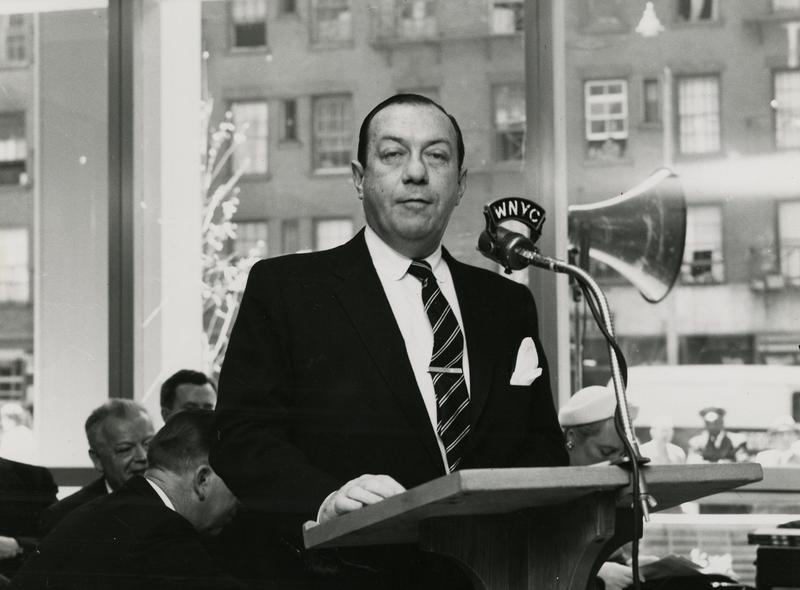
Mayor Wanger endorses Paul R. Screvane for Democratic candidate for New York City mayor. After explaining his rationale for his endorsements for Screvane, Oran Lehman for comptroller, and Pat Moynihan for city council president. Wagner fields questions from assembled journalists.
Mayor Wagner reads from a prepared script. He has just returned from a two week break.
He announced on June 10 that he would not seek a fourth term; he also said he would eventually name a successor. He did not want to intervene and direct political currents. He also did not want to court controversy.
He hoped a clear democratic front-runner would emerge. This did not happen. He now has to go against at least some friends.
he goes through his history with each Democratic candidate.
Abe Beame was 8 years his budget director. He ran as his running mate in 1961. Paul O'Dwyer is brother of William, who brought Wagner into city government. Wagner supported him for city councilman. "Not a team man"
William Fitzryan supported Wagner's candidacy in 1961.
Paul Screvane was his right hand man prior to becoming his running mate. He is one of the most able public servants.
Wagner can no longer remain aloof. He is too deeply involved. He worries about the reentrenchment of city bosses.
He gives his open support to Screvane. This will advance the victories of 1961. June 10 he announced he would not stand by if it called for his being active. He reiterates the influence of bosses that must be countered.
He endorses Screvane for mayor, Oran Lehman for comptroller, and Pat Moynihan for city council president.
He touts Screvane for his liberalism and his lengthy rise in city politics. He praises Lehman for his understanding of business and Moynihan for his veteran achievements.
He directly opposes Frank O'Connor, with regret. He praises O'Connor, but supports Moynihan. He notes Moynihan's role in Johnson's Great Society. He tells us Screvane organized the ticket.
Wagner answers questions:
He has not discussed how he will campaign.
He talks about Abe Beame's disagreement (which is rare) with Wagner's budget.
He answers questions about his decisions.
If Screvane loses the primary, he would most likely support the democrat.
Wagner has had second thoughts, but no regrets about not running.
He declines to discuss other candidates.
He has not discussed his decisions with Bobby Kennedy.
Asked about attacks from Beame on his administration, he is diplomatic, blaming his team.
He has no been pressured to choose Screvane.
There is no "Boss Wagner" ticket.
He has no immediate political plans.
He does not feel this will be a "clubhouse campaign."
Just because they defeated the bosses in 1961 does not mean they will not come back.
The return of the bosses is one of the main issues. He goes into the big social problems.
He will not answer if his support for a losing Screvane will affect the successes of the Democratic candidate.
He names [Carmine] DeSapio as one of the bosses.
He is asked again about campaigning, but declines to answer further.
He is asked about the Liberal Party's support for the republican candidate. He answers diplomatically.
He does not feel he will have a defensive role in the election. He prefers to be on the offensive.
He has not spoken with the President or Vice-President about the primaries.
He had not previous planned when he was announcing his support with Screvance.
Audio courtesy of the NYC Municipal Archives WNYC Collection
WNYC archives id: 150567
Municipal archives id: T1261
